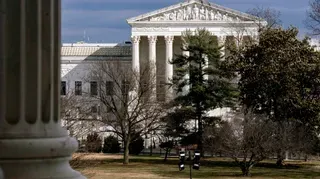January 21, 2014
Utah Ski Resort Sued Over Snowboarding Ban
Matthew Wexler READ TIME: 3 MIN.
A Utah resort long known as a skiers' mountain has been sued for refusing to open its slopes to snowboarders - a legal action that again exposed a culture clash on the slopes.
In their lawsuit filed last Wednesday, four snowboarders claimed discrimination on national forest lands that make up most of the Alta ski area in the mountains east of Salt Lake City.
The lawsuit says the plaintiffs bought tickets Sunday knowing they would be turned away at the chairlifts and could then sue the resort. One of them later sneaked onto the lift using "split boards" - a snowboard that splits apart and resembles skis - but was intercepted and escorted down the mountain.
Alta is one of the last remaining U.S. ski areas that bans snowboarding, and the lawsuit claims Alta dislikes snowboarders for their allegedly reckless skiing, inconsiderate attitude, baggy clothes and their overuse of such words as "gnarly" and "radical" when describing difficult terrain.
Deer Valley, another Utah resort, and Mad River Glen in Vermont also ban snowboarding. Taos in New Mexico relented in 2009 and allowed the practice.
Skiers' chief complaint is that snowboarders' sideways stance leaves them with a blind spot that can make their wide, sweeping turns a danger to others on the slopes.
Some say the culture war is old news now that young people are turning back to using a pair of skis instead of one board.
"Snowboarding as a sport peaked a couple of years ago. It was counter-culture, but it became too mainstream," said Riley Cutler, a partner at a Salt Lake City ski shop, Wasatch Touring. "Now kids are going back to skiing on twin tips and riding rails."
News of the lawsuit lit up the websites of Utah newspapers with passionate comments such as: Snowboarders "ruin all the snow" by scraping it down to ice; they "don't watch where they're going;" and they "stop in the middle of the hill and sit down! What's up with that?"
David Quinney, a minority owner of Alta, said customers prefer to have the mountain kept for skiers only.
"Alta is forbidden fruit for snowboarders," said Quinney, whose grandfather Joe Quinney founded Alta in 1939. "The thing about Alta, so much of it involves hiking, climbing and traversing. That's not real conducive to snowboarding."
Quinney said the culture clash that separated skiers and snowboarders in the 1990s has become a cliche, and banning snowboarding remains a matter of safety, not style.
"I'm a skier, always have been," he said. "There are skiers out there that appreciate going to a place that allows skiers only, not snowboarders."
The U.S. Forest Service also was named as a defendant in the lawsuit. Government officials declined comment, said Loyal Clark, a spokeswoman for the Uinta-Cache Wasatch National Forest.
Snowboarding might have lost some of its cool since starting in the late 1970s, but about a third of all resort visitors are still sliding downhill on one plank, not two, according to surveys by the National Ski Areas Association.
The lawsuit concedes that snowboarders were "perhaps rightfully" stereotyped as riffraff decades ago by more sophisticated and affluent skiers, but times have changed.
The plaintiffs in the lawsuit are Rick Alden, Drew Hicken, Bjorn Leines and Richard Vargas. They are asking a federal judge to declare that Alta's ban violates the Constitution's promise of equal treatment under the law.
Matthew Wexler is EDGE's Senior Editor, Features & Branded Content. More of his writing can be found at www.wexlerwrites.com. Follow him on Twitter and Instagram at @wexlerwrites.







